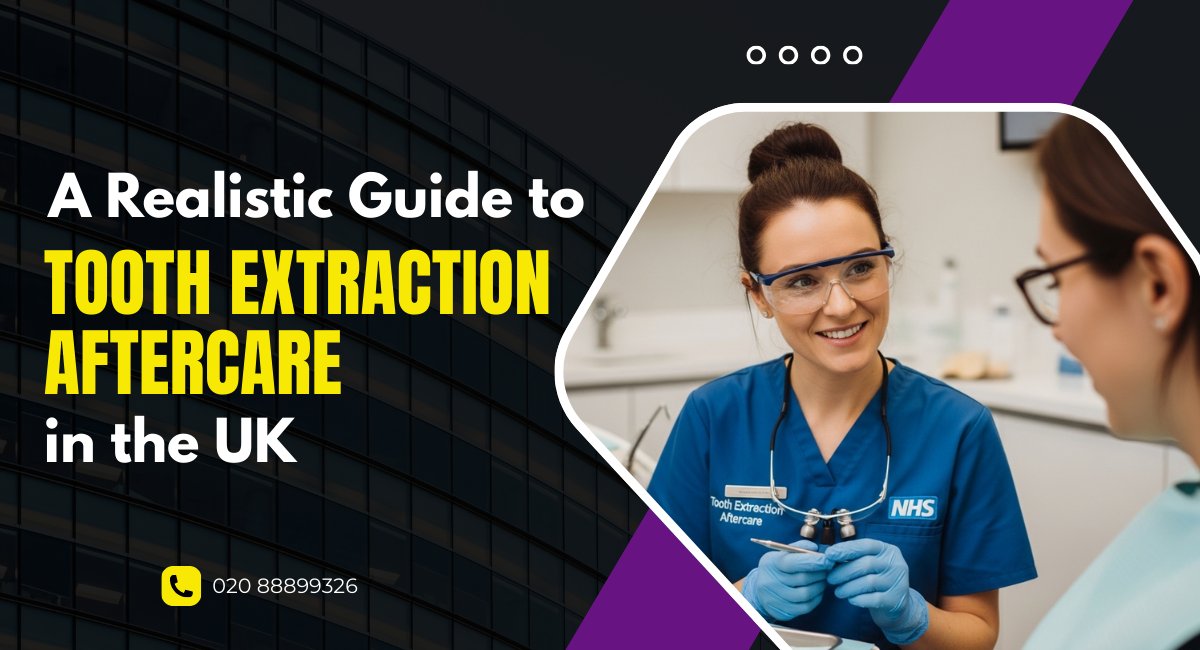Let’s be honest—no one wakes up excited about having a tooth pulled. Whether it’s a wisdom tooth playing up, a molar that’s beyond saving, or something else entirely, tooth extraction isn’t exactly a walk in the park. I’ve had two out over the past few years, and while the actual removal wasn’t as bad as I feared, it’s the aftercare that really makes or breaks your recovery. If you’ve just had one out or have one coming up, here’s everything I learnt from doing it twice (and making a couple of mistakes along the way). Consider this your no-fluff, straight-talking guide to tooth extraction aftercare UK style.
What to Expect Straight After the Extraction
So you’ve just come out of the chair and your mouth feels like it doesn’t belong to you. Totally normal. You’ll probably have a numb face for a few hours, and there might be a bit of blood. The dentist will have packed a bit of gauze in the socket—you’ll need to bite down gently on that for about 30–45 minutes. Don’t be alarmed if it looks like you’re bleeding loads—it’s often just a bit of blood mixed with saliva. I panicked the first time until I realised it wasn’t half as dramatic as it seemed.
The First 24 Hours Are Crucial
This is where the real tooth removal aftercare kicks in. Don’t rinse your mouth, spit, smoke, or use a straw. You want that blood clot in the socket to stay put. It’s your body’s natural bandage, and if it dislodges, hello dry socket (trust me, you do not want that). I stuck to soft food like yoghurt and mashed potatoes, and avoided anything hot or crunchy. Pain was manageable with over-the-counter meds.
Following NHS Tooth Extraction Aftercare Advice
The NHS tooth extraction aftercare advice is solid—take it seriously. They usually recommend rest, pain relief, and avoiding hard brushing near the site. They’ll also tell you to avoid alcohol and intense exercise for a couple of days. I ignored the ‘no gym’ bit once and instantly regretted it. The pressure spiked and I started bleeding again. Lesson learned. Honestly, NHS tooth extraction recovery can go smoothly if you don’t try to be a hero.
Cleaning Your Mouth Without Causing Trouble
You can brush your other teeth as usual, but steer clear of the extraction site for the first day or two. After 24 hours, the dentist will probably advise a saltwater rinse—just warm water and a bit of salt, swished gently (not too vigorous, or again, you’ll risk dislodging the clot). I did this morning and night for about a week. It sounds grim, but it really helps keep things clean without messing with healing.
What to Eat (And What Not to)
Soft, lukewarm foods are your best mates. Stick to soft foods like mashed potatoes, lukewarm soup, scrambled eggs, and yogurt. Avoid seeds, nuts, crisps, and crusty bread—basically anything that could poke into the site or get stuck in the socket. I once had a rogue bit of rice find its way in and spent an hour trying to get it out. Not fun. Also, no alcohol. I know, it’s rough. But it slows healing and messes with any meds you might be on.
Managing the Pain and Swelling
For the first couple of days, you might get some swelling. An ice pack wrapped in a towel worked wonders for me—20 minutes on, 20 minutes off. Painkillers help too, but don’t go overboard. Stick to what your dentist recommends. I alternated paracetamol and ibuprofen and stayed pretty comfortable. If the pain suddenly ramps up or doesn’t ease after a few days, ring your dentist—it could be an infection or dry socket.
Things I Did Wrong (So You Don’t Have To)
First time round, I rinsed too early and ended up with a bleeding socket that wouldn’t quit. Rookie move. Second time, I followed NHS tooth extraction after care advice to the letter and had no issues. Don’t smoke, even if you think one won’t hurt—it will. Don’t poke at the site, no matter how tempting. And please, don’t skip meals. You need energy to heal, even if chewing feels awkward at first.
When to Ring the Dentist
If you get a bad taste in your mouth, foul smell, worsening pain after a few days, or swelling that’s getting worse—not better—call your dentist. It could be an infection or a dry socket. Also, if you get a fever or feel generally rubbish, get checked out. Better safe than sorry.
Long-Term Healing and What to Expect
Most sockets heal over in a couple of weeks, but it can take months for the bone to fully settle. I noticed the site felt weird for a while—kind of sunken—but that’s normal. If you’re planning on getting an implant or bridge later, your dentist will guide you through the timing. I was back to normal eating within a week, but took things easy with chewier stuff for a bit longer.
Final Thoughts
Tooth extractions aren’t pleasant, but they’re often necessary. And with the right tooth extraction aftercare UK patients are advised to follow, recovery doesn’t have to be a nightmare. Take it seriously, listen to your dentist, and don’t rush it. Whether it’s NHS tooth extraction recovery you’re going through, or you’ve just had a private one done—the principles are the same. Give your mouth the rest it needs, and you’ll be back to chomping toast in no time.
If you’re unsure about anything or need follow-up care, don’t hesitate to reach out to your dental clinic. At SW19 Confidental Dental Clinic, we’re here to support you every step of the way—from extraction day to full recovery. Your comfort and oral health are our top priorities.









